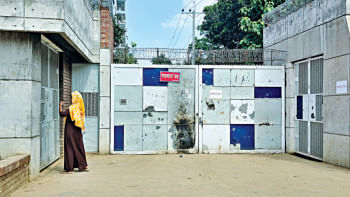Column by Mahfuz Anam: Business community's voice needed in the interim government

On September 9, in The Daily Star's roundtable discussion with business leaders, including those from the manufacturing, banking and fast job-producing IT sectors, urgent appeals were made to the interim government for help. First and foremost was the need for security. The disappearance of police from the scene and the overall lack of security in the industrial zones led to desperate appeals for army presence to ensure law and order. They specified five industrial belts: Ashulia, Narayanganj, Narsingdi, Chattogram, and Cumilla. These five zones constitute our crucial industrial base that must be protected with the highest priority. Normally, they wouldn't ask for the army's help, but they feel it to be an urgent necessity because of the power vacuum that has been caused by the sudden political change that we recently experienced.
Along with the physical protection of the above areas, what has been emphasised is the restoration of law and order in general. The truth is that, because of their role during the past regime, police now suffer from a severe backlash for which they hesitate to go to public places and take firm action when needed. This obviously sends out wrong signals to the criminal elements who are creating havoc in our factories.
With the sudden fall of a regime who appeared to have had endless unaccounted for power, there now exists a crisis of governance of sorts. The hatred towards police due to their partisan use has been multiplied a thousand times by their trigger-happy colleagues who killed more than a thousand students and citizens, and injured thousands more, as initial official estimates show. Our border guards—BGB—who have no training in crowd control or how to deal with mass protests, were used, which added to the death toll on the streets of Dhaka and the rest of the country. This has resulted in a tremendous anger and desire for revenge against the previous regimes and their henchmen: the politicians. Included in this is a section of the business community who did nothing but exploit their political connections to loot the country. This is exemplified by the so-called private sector adviser of the former regime, who could have been better termed "personal sector representative," as he never worked for the overall benefit of the private sector and used his privileged position to advance his own interest and those of his cronies.
This, however, led to an overall impression of the private sector as a product of undue privilege. This narrative is influencing both a section of our society, especially the young people, and some within the government, giving the impression that the interim government is not fully cognisant of the private sector's role in advancing, modernising and driving the economy as a whole. The fact that there is no representative from the private sector in the interim government is considered by many to be indicative of the above mindset. For the sake of our immediate and long-term growth, this has to change—and immediately so. We urge the interim government to appoint an adviser from the private sector.
An important fact that has to be remembered is that not the entire private sector was the recipient of the former regime's largesse. Only a section of them influenced policies that favoured only them. There is a large number of businessmen who suffered because they refused to toe the line. They did not default on loans. They paid their due taxes and yet got constantly harassed. The distinction between the genuine private sector and the crony entrepreneurs must be urgently and seriously made.
Regardless of the background of their owners, factories are national assets. How they built them must be a big factor in dealing with them, but what they built with personal assets or bank loans cannot be viewed as anything other than the collective wealth of Bangladesh. That particular viewpoint appears to have been put in the background. This is evidenced by reactions to factories owned by individuals close to the former ruling party or whose wealth has been a direct result of cronyism, undue favours, dubious tax breaks, and illegal practices that should have nothing to do with doing proper business.
Yes, none of them would probably have been anywhere near the wealth they accumulated without their political connection, yet their production facilities cannot be treated as "enemy properties" and burnt down, as has been the case for several industries. The direct impact of such action is the threat to the jobs of workers. The vandalism and looting of stocks and raw materials, and in many cases of the machinery and its spare parts, clearly indicate the involvement of elements for whom national interest is of least concern.
With all the nepotism, corruption, looting of the national exchequer, and power abuse, Bangladesh's economy has grown. However flawed it is, with all its inner weaknesses, we increased exports—some would question the undeserved subsidies and tax facilities that were given—and captured new markets, and brought in technologies to make new products, thus expanding our export markets. Take the latest statistics (some of which needs to be more thoroughly verified), there is strong and undeniable evidence of our advancing economy.
The country is now poised for some fundamental changes. While the talk about a new constitution or serious amendments to the old one has been going on, a similar discussion for changes in the economy has not been that forthcoming.
We need fundamental reforms in the way we do business. To attract FDI and increase local investment, we need urgent reforms in the banking laws and regulations. To start with, we must make the professional management of banks mandatory and introduce international practices in regulating the role of bank directors who think of themselves as "owners" of the banks and not small shareholders, with the depositors being the main owners. The practice of protecting the depositors' rights must immediately be introduced. It's the directors that can be held as mostly responsible for destroying the banking system.
We must investigate why we have not been able to attract FDI over the past decades in spite of our economy's growth. Mega-corruption was of course a big factor. Too many laws are in operation that inhibits entrepreneurship. Bureaucratic hassle, land registration issues, and the overall delay in getting things done all contribute to the lack of efficiency in our system, which must be changed if we are to realise our potential.
We must remember when people or companies invest either in one's own or in a foreign country, it's their own wealth—or borrowed from banks—that they are investing. We should allow them to make legitimate profits and prevent them from profiteering. The precondition for this to work is an intangible element called confidence, which comes from a whole set of factors, such as the legal framework, business practices, political interference, corruption, and bringing those who break the law to justice. Many foreign investors came to Bangladesh, and after waiting several years, they left because they felt we are not dependable in terms of business stability. This is not to say that foreign investors have no flaws—sometimes they push investment in areas that are not our priority or in terms that do not suit us—but the overriding need for them cannot be ignored. If state-controlled countries like China and Vietnam can attract huge FDI, why can't we who practise market economy? The reason is that they are able to generate that intangible factor that we referred to earlier: confidence.
It is our hope that the new Bangladesh, headed by a man of vision and integrity and with unrivalled global respect, and driven by the energy and honesty of the young people with the wholehearted support and confidence of the public, will be able to create that vital trust and necessary confidence both within the nation and among the international community, and we will be able to build a democratic, equitable and rights-based future.
Mahfuz Anam is the editor and publisher of The Daily Star.
Follow The Daily Star Opinion on Facebook for the latest opinions, commentaries and analyses by experts and professionals. To contribute your article or letter to The Daily Star Opinion, see our guidelines for submission.

 For all latest news, follow The Daily Star's Google News channel.
For all latest news, follow The Daily Star's Google News channel. 









Comments